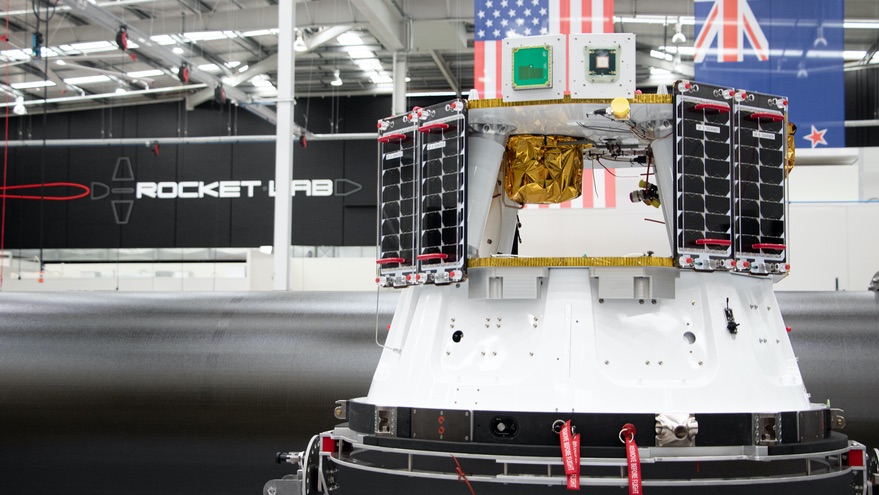Products You May Like
WASHINGTON — Rocket Lab launched six smallsats for a variety of commercial and government customers March 22 on a mission also intended to demonstrate the performance of its own smallsat bus.
The company’s Electron rocket lifted off from Launch Complex 1 at Mahia Peninsula, New Zealand, at 6:30 p.m. Eastern. The rocket deployed its kick stage eight and a half minutes after liftoff and, after a 40-minute coast, fired its Curie engine for nearly two minutes. Four minutes later, it deployed five payloads into a 550-kilometer circular orbit inclined at 45 degrees.
The kick stage performed two more firings of its Curie engine before releasing the sixth payload into a 450-kilometer orbit 1 hour and 49 minutes after liftoff.
The largest payload on the launch was a Gen-2 satellite for satellite imaging company BlackSky, the seventh in that series of spacecraft that produce high-resolution imagery. It was the satellite deployed to the lower orbit.
The launch also carried two 6U cubesats built by Tyvak Nano-Satellite Systems for two separate Australian companies developing internet-of-things satellite constellations: Myriota 7 for Myriota and Centauri 3 for Fleet. In addition to providing internet-of-things services, Centauri 3 will test technologies for a proposed lunar smallsat mission being studied by a team of Australian companies.
The other three smaller satellites were Gunsmoke-J, a 3U cubesat developed by the U.S. Army Space and Missile Defense Command (SMDC) whose launch was arranged by TriSept, and 1U technology demonstration satellites by Care Weather Technologies and the University of New South Wales Canberra Space.
The Gunsmoke-J satellite attracted the most attention, and controversy, in New Zealand because of concerns raised by some organizations there that the satellite could be used by the U.S. military for targeting weapons, specifically nuclear weapons. Those groups, as well as New Zealand’s Green Party, asked the government to suspend licenses granted by the New Zealand Space Agency for Gunsmoke-J and other U.S. military payloads.
SMDC describes Gunsmoke-J as a demonstration of technologies “that could assist the ground force commander in long-range precision fires and other activities.” The spacecraft will test the ability to provide imagery directly to troops in the field. The New Zealand government took no steps to halt the launch.
In addition to deploying the six satellites, the mission will test the company’s Photon satellite bus, which is based on the kick stage. The “Photon Pathstone” will be the second such test of Photon after its “First Light” mission launched in August 2020. Those tests, the company said, will test systems needed for launching NASA’s CAPSTONE lunar smallsat mission later this year.
The launch was the first for Rocket Lab since it announced March 1 its intent to go public through a merger with Vector Acquisition Corporation, a special-purpose acquisition corporation. That deal, expected to close in the second quarter, will provide Rocket Lab with about $750 million in capital and value the company at $4.1 billion. The company announced at the same time its intent to develop Neutron, a medium-class launch vehicle.
In an interview during the company’s webcast of the launch, Peter Beck, chief executive of Rocket Lab, offered no updates on either the SPAC deal or development of Neutron. He did say that Rocket Lab’s next attempt to recover an Electron first stage was “not too many missions away.” The company recovered the first stage from an Electron launch for the first time in November.
That upcoming launch, he said, will include upgrades such as a more robust heat shield at the base of the rocket. “We’re expecting much better performance and hopefully much better condition of the stage when we go pick it back up.”
